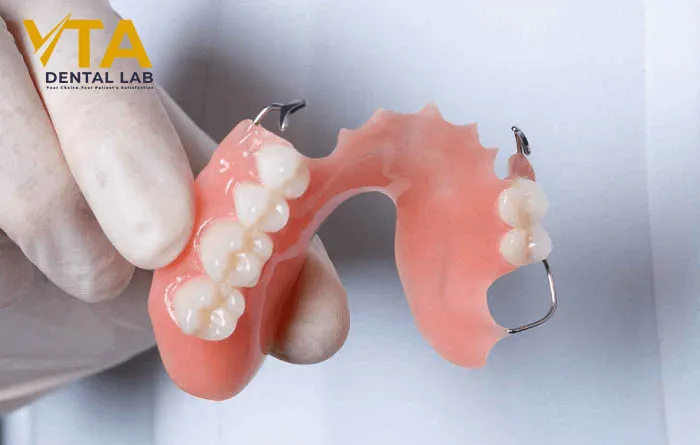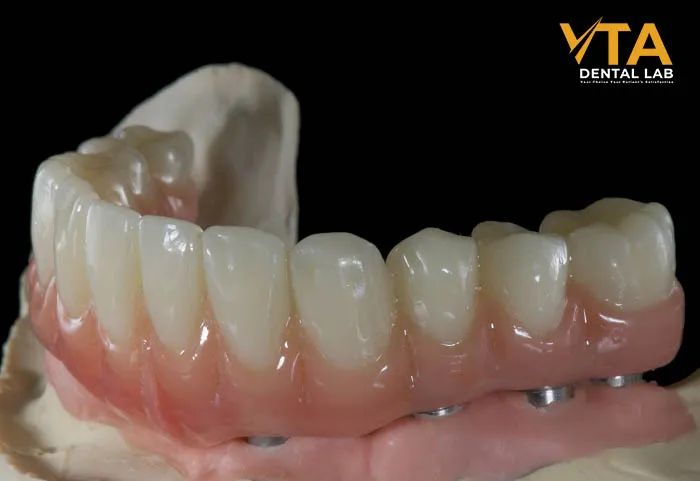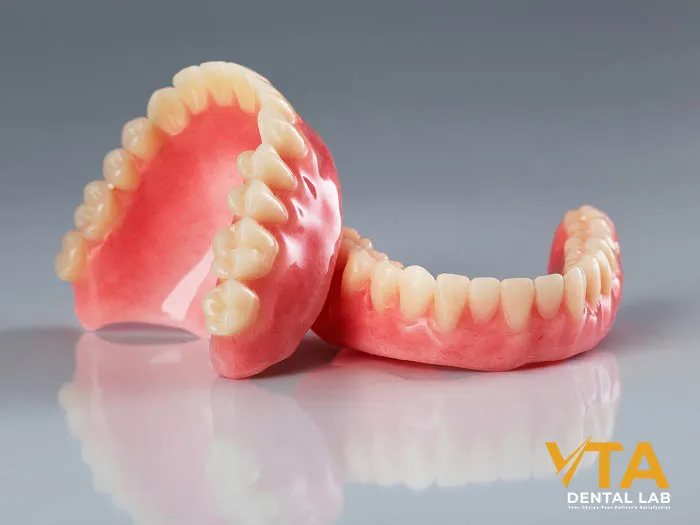Acrylic Dentures: Features, Pros, and Cons Explained
Acrylic dentures are a popular choice in modern dental restoration. With the ability to recreate a natural smile and enhance chewing and speaking functions, acrylic dentures offer not only convenience but also high aesthetic appeal. Let’s explore the details of acrylic dentures to understand why they are the ideal solution for anyone seeking a bright and confident smile.
What Are Acrylic Dentures?
Acrylic dentures, also known as false teeth, are prosthetic teeth made from acrylic. They are designed to fit snugly with any remaining teeth to give patients the feeling of having a complete set of teeth. These dentures help patients who have lost most of their teeth to chew food and speak normally.

Acrylic is a highly regarded material for its durability and functionality. Acrylic dentures are removable and consist of a plastic base that holds the artificial teeth. This prosthetic structure is designed to mimic the function of natural gums and teeth.
This dentures may not be recommended for patients with acrylate allergies, severe gum issues, or unstable bone structures that cannot support dentures. Additionally, patients with sensitive gums, delicate oral mucosa, or high aesthetic demands should carefully consult with their dentist to choose the most suitable denture type.
Features of Acrylic Dentures
Acrylic dentures are used for either full or partial tooth loss, helping to restore the aesthetic appearance of the oral cavity and face, as well as chewing function.
- Structure: These dentures include an acrylic base that resembles the gums, onto which artificial teeth are mounted. The base can be made of plastic or ceramic.
- Natural Appearance: Acrylic teeth can replicate the color and shape of natural gums and teeth, providing a realistic look.
- Material Safety: Acrylic is a special composite resin that is non-toxic and safe for patients’ health.
- Ideal Application: Acrylic dentures are an excellent solution for patients with significant tooth loss. Upper dentures are designed to fit snugly over the palate and are secured using suction, while lower dentures rely on the jawbone for stability.
Acrylic is favored for its affordability, durability, and lightweight properties. It helps prevent deformation of the denture base and maintains the structure of the artificial teeth over time.

Benefits of Acrylic Dentures
Acrylic full or partial dentures are a widely chosen solution in modern dentistry due to their durability and versatility. Their excellent opacity hides underlying structures, providing a natural-looking smile. These dentures are ideal for patients seeking a balance of aesthetics, functionality, and affordability.
Key benefits include:
- Affordable Cost: Compared to other restorative methods, acrylic dentures are more cost-effective. They offer good quality and functionality while remaining budget-friendly for patients looking to restore their smile and chewing function economically.
- Customizable Fit: Acrylic dentures can be easily designed and adjusted to match each patient’s unique dental structure, ensuring a snug fit and reducing the risk of gum irritation with long-term use.
- Lightweight and Comfortable: The lightweight nature of acrylic ensures comfort and minimizes pressure in the mouth, particularly for first-time users.
- Easy Adjustments: If the fit is imperfect, dentists can readily make adjustments to improve comfort and proper fit.
- Force Distribution: Dentures distribute chewing forces evenly across their surface, reducing wear not only on the dentures but also on adjacent natural teeth, preserving overall oral health.
- Longevity: With proper care and regular cleaning, acrylic dentures can last a long time, typically between 3 and 5 years.

The Disadvantages of Acrylic Dentures
Acrylic dentures have certain drawbacks, some of which are less common or absent in other types of dentures, such as those with clasps. Patients may experience discomfort initially when using these dentures, but this typically diminishes or disappears over time.
Other potential issues include:
- Hardness of Material: The rigidity of the acrylic material may cause scratches or injuries to the oral mucosa.
- Altered Taste Perception: Full acrylic dentures that cover the entire palate may impact taste perception, as food cannot directly contact the roof of the mouth.
- Allergic Reactions: Some patients may develop allergic reactions to acrylic components, particularly with poor hygiene, which can lead to oral health problems such as oral thrush.
In conclusion
Acrylic dentures are a reliable and cost-effective solution for those looking to restore their smile, improve function, and regain confidence. With their lightweight nature, ease of customization, and natural appearance, acrylic dentures are an excellent choice for various dental needs.
However, it’s important to choose a reputable dental lab that provides high-quality prosthetic products for patients. At VTA Dental Lab, our experienced technicians use advanced techniques to craft acrylic dentures that fit perfectly, offering comfort and natural-looking results. Contact us now for detailed information!